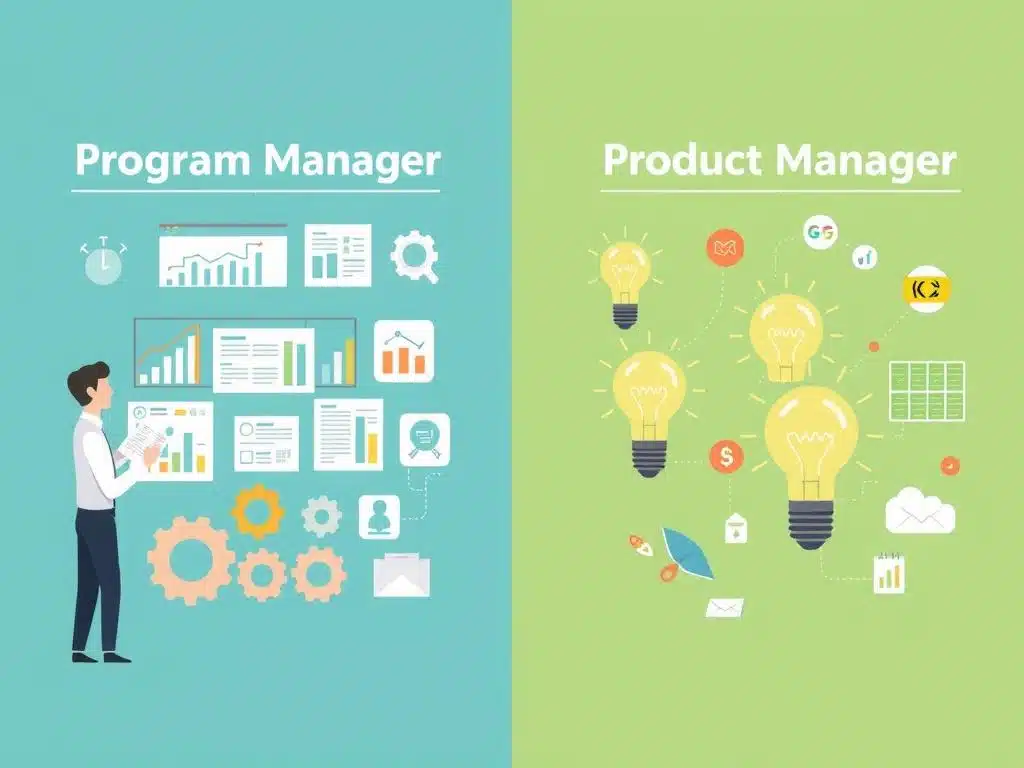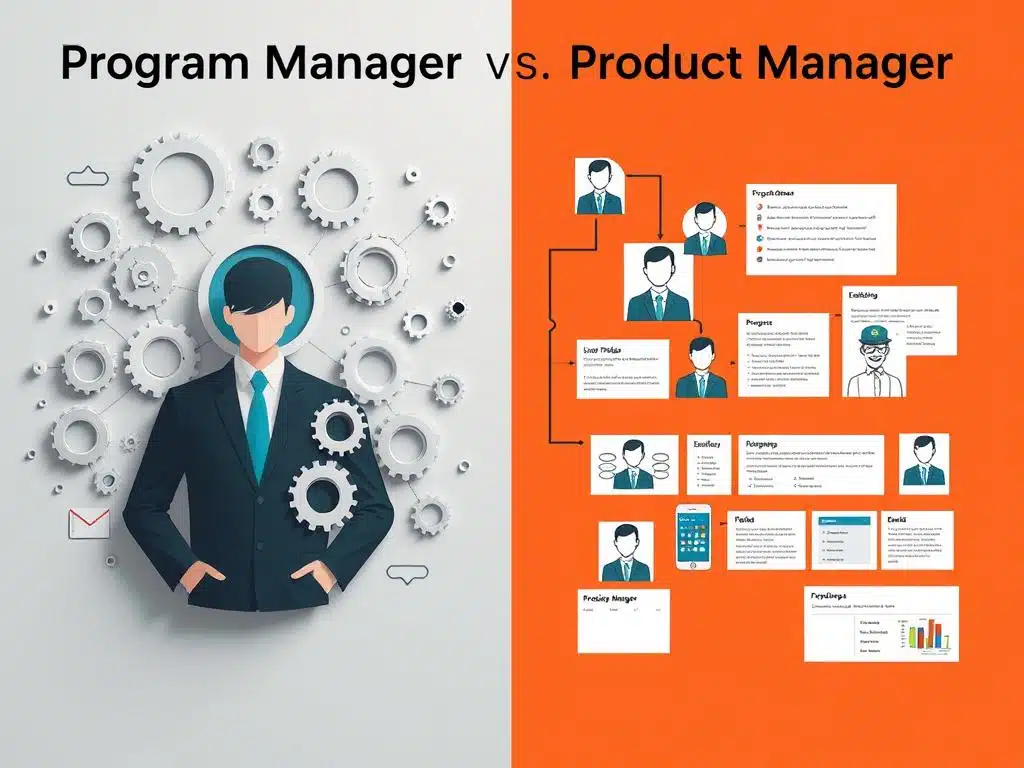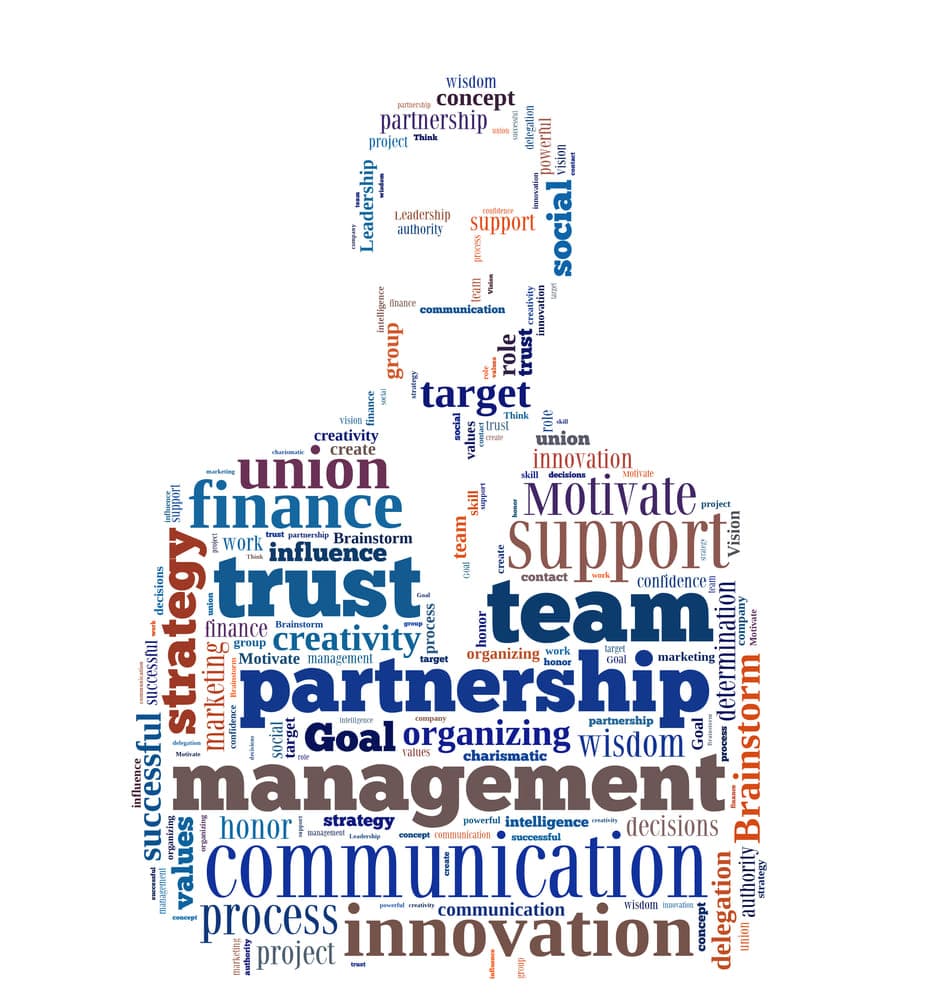In the business ecosystem, understanding the distinctions in program manager vs product manager is crucial, as program managers and product managers play pivotal but distinct roles. If you’re wondering how they differ, consider this: A program manager focuses on driving multiple projects to align with overall business strategies, while product managers center on developing a product from concept to launch, guided by user needs and market competition. This article distills their key functions, shedding light on the ‘program manager vs. product manager’ debate for those navigating their career paths or structuring their teams.
Key Takeaways
- In the debate of program management vs. product management, program managers align multiple projects with strategic business goals and provide resources, while product managers lead product teams from conception to launch, focusing on market demands and user experience.
- Program managers handle strategic oversight and coordination across projects, managing risks and resources, whereas product managers drive product vision and execution, transforming market input into tangible strategies.
- Although their paths differ, program and product managers often collaborate, balancing project priorities and organizational strategy to ensure the successful execution of projects and product development.
Understanding the Roles: Program Manager & Product Manager

Within the sphere of business execution, program managers can be compared to orchestral conductors, adeptly steering various projects towards a cohesive alignment with overall business goals. Program managers coordinate multiple projects and project managers, focusing on overarching goals and strategic alignment of initiatives within the company. Conversely, product managers play the role similar to lead soloists guiding their teams—the ensemble of product experts—from the initial idea through to its final market debut, aiming for their creation’s success.
Each has a critical but varied approach. While one synchronizes multiple initiatives under the company’s strategic vision, the other focuses on bringing individual products to life that resonate within the marketplace. Understanding the nuances of program management vs. product management helps in appreciating the unique contributions of each role to the business ecosystem.
The Strategic Scope of Program Management
Program managers play a crucial role in aligning various projects within an organization’s portfolio to its strategic objectives, acting as the conduit between upper management’s vision and the tangible tasks carried out by project teams, including those led by project managers. Entrusted with essential responsibilities such as resource distribution and offering strategic direction, they guide the company towards achieving its overarching aims.
Expertly blending individual project results with overall business goals is their strong suit. They ensure that each maneuver on the tactical playing field brings the organization closer to ultimate victory—its success. The strategic scope of program management vs. product management becomes evident as program managers align various projects with the organization’s strategic objectives.
The Tactical Focus of Product Management
Product managers immerse themselves in the details, tackling tactical issues to maintain product excellence. As guardians of the product roadmap, they synchronize technological possibilities with market demands. The role requires a thorough understanding of the reasons behind each feature, user interface decision, and customer engagement to guarantee that the final product is not only viable but also indispensable.
Collaborating closely with their engineering team counterparts, product managers combine strategic vision with practical execution. They craft products that connect deeply with users and distinguish themselves within the competitive arena.
Delineating Responsibilities: Who Does What?

Program managers and product managers serve as organizational architects, meticulously crafting plans to navigate strategic milestones while vigilantly overseeing risks, timetables, and financial parameters. More than just their job titles suggest, these individuals act as guardians of strategic objectives, ensuring that every endeavor is carried out with meticulous attention to detail and aligns seamlessly with the broader business aims. This role delineates a unique concentration and purpose within an enterprise distinct from both program managers and product managers. Delineating responsibilities in program management vs. product management helps in understanding the unique focus areas of each role.
Program Manager’s Oversight & Coordination
Program managers oversee the coordination and alignment of multiple projects, ensuring they are in tune with the organization’s strategic plan. These program managers utilize their expertise in risk management, resource allocation, and budget supervision like maestros wielding batons to ensure each element of their suite of projects resonates perfectly with the intended composition. They monitor overall development within programs closely, fine-tuning where required for triumphant results.
They skillfully manage communications across multifaceted teams, eliciting top-tier efforts through leadership that rises to a climax towards productive and timely fulfillment of projects.
Product Manager’s Vision & Execution
At the heart of product development, product managers shoulder essential duties that include:
- Turning conceptual ideas into actual products
- Translating market indicators into actionable strategies
- Steering the creation of a clear and compelling product vision
- Sculpting market possibilities to uncover what could become the next big hit in the marketplace
These roles are vital for a product’s triumph. Product managers oversee every phase from beginning to launch, guaranteeing that not only is the product realized, but it also thrives once users adopt it, fulfilling its pledges and meeting anticipated outcomes.
Collaborative Dynamics: Interaction Between the Two Roles

While product and program managers typically follow distinct trajectories, their collaborative efforts are essential for organizational success at critical junctures. Program managers work closely with several teams to support the product as a whole and are involved in organizing activities that align with overall business goals. Program managers outline the strategic direction, which converges with the innovative spirit steered by product managers. This synergy guarantees that the product roadmap is not just in sync with the strategic objectives of the program but also lays a foundation for triumphant project results. The collaborative dynamics in program management vs. product management are essential for organizational success at critical junctures.
Synergy in Strategy & Planning
Working in tandem, product managers and program managers create a strategic convergence that infuses product features with the essence of organizational goals. Their joint action harmonizes project focus and resource distribution, weaving together a plan that embodies foresight and feasibility. Grasping the differences between a product manager and a program manager role is essential for enhancing collaboration and outcomes within this framework. Understanding the synergy in strategy and planning in program management vs. product management is crucial for enhancing collaboration and outcomes.
Such synergy acts as the foundry where organizational triumph takes shape, uniting the meticulous creation of product functionalities with overarching strategic aims.
Balancing Innovation & Execution
Within the complex dynamic of creation and execution, the dialogue between product managers and program managers is crucial, enabling the flow of concepts and necessary alterations for project accomplishment. Product managers keep abreast of innovative functionalities, assessing innovation against practical execution demands—a harmony sustained by adaptable and receptive input from program managers. Balancing innovation and execution in program management vs product management requires a harmonious dialogue between the two roles.
Skill Sets Unpacked: Essential Competencies for Each Role

Examining the competencies necessary for each position, it becomes evident that program managers must excel in strategy, risk management, and communication. Conversely, product managers require proficiency in market research, user experience design, and technical know-how. These skills are foundational to their roles. They allow program managers to deftly steer through the intricacies of organizational leadership and enable product managers to connect deeply with consumer behavior insights. Unpacking the essential competencies in program management vs. product management reveals the distinct skill sets required for each role.
Program Manager’s Strategic Guidance Skills
Program manager roles entail acting as the architects of strategy, with their ability to offer strategic guidance serving as a navigational beacon for the program’s direction. These managers occupy a pivotal position at the forefront, adeptly managing risks with predictive acumen akin to an experienced navigator and overseeing resource distribution so it is prudent and effective. As program managers, they are charged with navigating programs towards triumphal outcomes.
Product Manager’s Customer-Centric Skills
Within the sphere of product management, understanding and catering to customer needs is paramount. Product managers, as devoted champions in this field, pay close attention to market trends and are highly receptive to customer feedback. They develop roadmaps that serve not merely as pathways for bringing products to market but also as guides towards achieving deep-rooted customer satisfaction.
Career Trajectories: Paths to Leadership
Program and product managers traverse a career path that elevates them from the trenches of project implementation to the apex of strategic oversight. Possessing an extensive view across various facets of business operations, program managers are well-positioned to step into roles within product management where they can leverage their strategy-oriented perspective on specific avenues of product development.
In contrast, those serving as product managers come armed with a comprehensive grasp on market trends and adeptness in crafting product strategies. This knowledge base paves their way upward toward higher echelons of authority, where they apply their seasoned insights to steer organizational expansion and chart out its strategic course. Understanding the career trajectories in program management vs. product management helps in navigating the path to leadership.

From Project Management to Program Management
As project managers seek to transition into the realm of program management, they embrace an enlarged role that involves skillfully coordinating resources across various projects while ensuring each initiative is in harmony with the organization’s strategic objectives. This shift signifies moving beyond managing a singular project to directing a comprehensive suite of programs.
From Product Ownership to Senior Product Manager
To ascend to higher ranks, product managers are required to exhibit:
- Profound expertise in formulating and executing product strategy
- A track record of successfully bringing products to market
- Strong leadership capabilities that guide the product team adeptly amidst fluctuating market demands.
Measuring Success: Key Performance Indicators (KPIs)
As key performance indicators (KPIs) serve as navigational aids toward organizational achievements, they offer program and product managers critical data about their initiatives’ success and productivity. Program managers utilize KPIs to track the progress of programs and evaluate how well resources are being allocated in alignment with business objectives. Similarly, product managers apply these metrics to assess market reach and monitor levels of customer satisfaction. Measuring success through KPIs in program management vs. product management provides critical data about their initiatives’ success and productivity.
Program Manager’s KPIs: Program’s Progress & Business Impact
Program managers utilize KPIs as a control panel that sheds light on the program’s financial and operational wellness, offering an overview of its impact on business. Metrics such as budget compliance and procedural effectiveness are essential indicators of a program’s performance, steering strategic choices and prompting necessary adjustments.
Product Manager’s KPIs: Market Penetration and Customer Satisfaction
On the flip side, product managers depend on Key Performance Indicators (KPIs) that showcase the pulse of their products in the marketplace—such as sales figures, penetration within the target market, and insights from customer feedback. These metrics are crucial for not only determining success but also for directing a product’s ongoing development to go above and beyond what its target market anticipates.
Organizational Structure: Where They Fit In
In an organizational framework, program and product managers may occupy varied levels within the hierarchy. As leaders who bridge multiple departmental teams, program managers play a critical role in ensuring strategic alignment across functions. Understanding the organizational structure in program management vs product management helps in identifying where each role fits in.

Program Managers’ Cross-Functional Leadership
Program managers, serving as cross-functional leaders, work diligently to promote interdepartmental collaboration. Their leadership is pivotal in making sure that all parts of the organization’s structure function seamlessly together, propelling strategic initiatives ahead.
Product Managers’ Core Team Engagement
Integral to their teams, product managers collaborate closely with the individuals directly participating in the development of the product, ensuring that their concentrated involvement is vital for the evolution and success of the product.
Salary Insights: Compensation Comparisons
The remuneration for program managers and product managers reflects their position in the company as well as their impact on organizational achievements. The size of the company they work for, their level of experience, and other factors all affect program managers’ salaries. Meanwhile, compensation for product managers hinges significantly on how successful their products become and how effectively they can propel corporate results forward. Salary insights in program management vs. product management reflect their position in the company and their impact on organizational achievements.
Factors Influencing Program Manager Salaries
Particularly in the technology and aerospace sectors, where they are highly sought after, technical program managers tend to receive higher wages due to their specialized skills and deep industry knowledge. The level of experience these professionals possess also affects their salaries. Veteran program managers who have a track record of successfully leading intricate and multifaceted programs often earn pay that reflects their extensive experience.
Factors Affecting Product Manager Salaries
Product managers earn salaries that are proportionate with the success of their products in the marketplace, indicating how effectively they’ve guided their projects to profitability. The financial performance of the company and personal accomplishments play a pivotal role in determining their remuneration, allowing outstanding product managers to command paychecks that correspond with their substantial impact on the company’s success.
Summary
Program management vs. product management holds distinct yet essential positions that significantly contribute to a company’s achievements. When exploring the nuances of product manager vs. program manager, it is evident that product managers immerse themselves in understanding customer requirements and navigate the creation of products aligned with market needs.
Conversely, program managers operate at broader organizational levels, overseeing long-range goals and aligning various project paths so they collectively reach their strategic targets. This encapsulates where program managers focus: maintaining an overarching perspective to harmonize disparate project elements within the organization.
Frequently Asked Questions
What are the primary concerns of a program manager versus a product manager?
In summary, the primary concerns in program management vs. product management are distinct, with program managers supervising various projects and ensuring their alignment with the strategic objectives of the organization. Conversely, a product manager is dedicated to managing the lifecycle of a product by setting its vision and directing its strategy to satisfy market needs.
How do the key skills required for program managers & product managers differ?
Program managers and product managers must possess distinct key skills. Program managers require strong communication abilities and expertise in strategic planning to effectively orchestrate various projects, while product managers are expected to have proficiency in market research as well as technical know-how in order to create products that thrive in the marketplace.
Can a project manager transition to a program manager or product manager role?
Certainly, by expanding their viewpoint to oversee numerous projects or honing in on product strategy and the requirements of customers, a project manager can successfully make the leap to either a program manager or product manager position.
What factors affect the salaries of program managers & product managers?
Compensation for program managers and product managers varies based on factors such as sector, scale of business, and level of experience. Program managers in the technology and aerospace industries tend to receive more substantial salaries. Conversely, earnings for product managers hinge upon the success of their products, the overall financial health of their company, as well as personal accomplishments that impact product strategy and its foothold in the market.
How do program managers & product managers measure the success of their efforts?
While program managers assess their achievements using metrics such as financial, customer-oriented, operational, and business capability indicators, product managers focus on KPIs that track sales outcomes, market reach, and the satisfaction of customers. By utilizing these measures, individuals in both positions can accurately gauge their success in alignment with overarching business objectives without compromising attention to detail or strategic direction.

















14 Responses
Thanks for sharing. I read many of your blog posts, cool, your blog is very good.
Combining EQ with another steroids that harm cholesterol
would require you to take a extra proactive strategy to keeping cholesterol levels wholesome throughout your cycle through food regimen and cardiovascular exercise.
The small modification to the testosterone hormone that has resulted in EQ brings some nice advantages.
In specific, EQ has solely about half the aromatizing energy of testosterone,
which can tremendously scale back its estrogen-related
unwanted effects when compared with normal testosterone steroids.
Being a Nandrolone steroid, Trenbolone can also suppress
your testosterone for years or even for all times. On the other hand, most men can recover regular testosterone function with a good PCT cycle after utilizing Boldenone.
Some males completely use EQ for efficiency features and never essentially for bulking or even cutting.
If you might be contemplating utilizing NPP (Nandrolone
Phenylpropionate) or any other anabolic steroid for bodybuilding purposes, it’s necessary to approach
it with warning and prioritize your health
and well-being. IGF-1 (Insulin-Like Progress
Factor-1) is a naturally produced hormone of immense anabolic energy.
It can also be essential to our body’s recovery skills,
and affects nearly every cell within the human body.
As such, it supplies adverse suggestions to the HPG axis to suppresses testosterone
levels, additional lowering the obtainable testosterone and DHT,
compounding its negative results on erectile perform.
There isn’t any query that anabolic lee priest steroids carry therapeutic benefits for sufferers with
HIV, liver illness, renal failure, some malignancies, symptomatic hypogonadism,
and burns. However right now, the most important downside with these
agents is misuse.[34] Regardless Of legislation to restrict the empirical prescription and dishing out of those agents,
these medicines proceed to be misused by many people,
particularly athletes. Steroid detection instances can be influenced by
many alternative elements, mostly involving the totally different metabolic pathways and excretion strategies.
The versatility of this cycle makes it highly appropriate
for simply about any aim, from gaining lean mass and bulking to chopping.
These are the core effects of Equipoise, and yes, they take some time to kick in, but guys will at all times be impressed when Boldenone is taking full
impact wherever from the eighth to the 12th-week mark. Every Little
Thing will really feel lighter, and specific positive aspects are often in the range of 20-30lbs more on deadlifts and
20lbs and up on bench presses. Extra endurance, leaner, and harder are the first bodily and
performance outcomes you want to discover by
the 6-week mark, if not earlier. With EQ’s decrease
androgenic score, women will usually take round 50mg/week and be capable of hold virilizing effects at bay, with some known to take as much as mg.
Most steroid customers are conversant in the legendary compound
Dianabol, which EQ shares a virtually identical chemical structure with.
In the future, the Dianabol dose ought to be increased to 20 mg/day until the cycle is completed.
Like males, girls will see slow and steady features with
EQ, including energy and muscle gains. Women can probably build extra muscle as they will be extra sensitive to the anabolic effects of Equipoise, and a
few excellent vascularity may be achieved if they
are relatively low in body fats.
TST in hypogonadal men results in elevated levels of free serum testosterone and, in flip,
DHT. This occurs as a outcome of conversion of testosterone to
DHT via 5AR inhibitors (5ARi) (19,20). Androgenic alopecia,
or male sample hair loss, usually happens in 20% of 20-year-old men after which increases by approximately 10% every 10 years (21).
A important position for DHT in hair development could be seen in the case research
of males with Imperato-McGinley syndrome. This condition results
from a mutation within the gene for sort II 5AR that stops the expression of the enzyme.
In post-menopausal women, 50 mg/wk of nandrolone
for 3 weeks considerably decreased HDL-C and Apo A1 levels [101].
In male bodybuilders, 42 mg/wk of oral stanozolol administration has proven to significantly scale back HDL-C, ApoA1 and
TGs after 6 weeks while additionally increasing LDL-C [96].
In wholesome males, one intramuscular injection of 50 mg of stanozolol resulted in a major discount and improve in HDL-C and LDL-C levels respectively
28 days later [102].
70918248
References:
what is the best legal steroid to take (https://www.interamericano.edu.bo)
I don’t think the title of your article matches the content lol. Just kidding, mainly because I had some doubts after reading the article.
Can you be more specific about the content of your article? After reading it, I still have some doubts. Hope you can help me.
what is considered a high roller
References:
what is A high roller in poker (Clinfowiki.win)
Thanks for sharing. I read many of your blog posts, cool, your blog is very good.
Thank you for your sharing. I am worried that I lack creative ideas. It is your article that makes me full of hope. Thank you. But, I have a question, can you help me?
bookmarked!!, I love your blog! https://Bookofdead34.Wordpress.com/
I don’t think the title of your article matches the content lol. Just kidding, mainly because I had some doubts after reading the article.
Your article helped me a lot, is there any more related content? Thanks!
Thanks for sharing. I read many of your blog posts, cool, your blog is very good.
There can also be speculation round whether or not sure Boldenone metabolites act as aromatase inhibitors and attenuate the estrogenic activity of the mother or
father hormone. Sensible compound choice to maximize efficiency varies widely between different sports activities.
Testosterone and its derivatives, Dihydrotestosterone (DHT) and its derivatives, and Nandrolone (19-Nortestosterone) and its
derivatives. However, its gentle nature and excessive tolerance among women and men make it a popular steroid from a
safety perspective. One distinctive benefit that has
been documented in research is that Anavar decreases visceral and subcutaneous fat ranges.
We have found that a SERM may be a extra wise choice
than an AI (aromatase inhibitor), as the latter can worsen blood
lipids, increasing the danger of hypertension.
Deca Durabolin (nandrolone) is a bulking steroid also capable of including notable amounts of muscle mass by
enhancing protein synthesis and nitrogen retention in muscle
fibers. Deca Durabolin also generally improves muscle fullness
by rising intracellular fluid volume. Since testosterone is injectable, it isn’t a handy anabolic steroid for
some customers. Nevertheless, this methodology of entrance
permits it to reach the bloodstream promptly, bypassing
the liver, in distinction to C-17 alpha-alkylated Steroids voor Gewichtstoename 2024.
As a outcome, testosterone has minimal hepatotoxic results, which have been documented
in analysis (1). Thus, the most effective steroid for first-time users is one which produces substantial muscle mass whereas exhibiting minimal opposed
results. Additionally, novices typically chorus from stacking steroids in tandem because of extra extreme unwanted facet effects.
Because of the intimate role of testosterone
in erectile function, erectile dysfunction can develop as a post-cycle aspect
impact of AAS use. Nonetheless, it should be stored in thoughts that erectile
dysfunction in an AAS consumer isn’t necessarily the end result
of AAS use per se and could be a symptom of an underlying psychiatric dysfunction. The presence of rigid
morning or evening erections, sudden onset, intermittent course and
short period are an excellent indication of a psychogenic trigger.
Lack of morning or night time erections, a gradual onset,
progressive course, or long period suggest an organic trigger.
Bodybuilders and athletes often use peptides as performance-enhancing medicine to
stimulate restoration, build muscle, and/or enhance fats loss.
However, you will need to note that WADA bans most peptides, and utilizing them in or out of competitors is strictly prohibited.
Furthermore, many peptides are research compounds, and ought
to be clearly labeled accordingly. General, the actions of peptides are targeted,
typically involving particular mobile receptors or
signaling pathways, and sometimes don’t possess the broad androgenic results seen with anabolic steroids.
Some drugmakers and exercise magazines claim that andro merchandise assist athletes practice tougher and recover sooner.
The physique turns andro into the hormone testosterone and a form of the
hormone estrogen. The stress to win leads some athletes to make use of
medication which may give them an edge. Testosterone is the bioidentical anabolic androgen we endogenously produce and depend on,
and is most of the time the most intelligent
hormone to make use of for a primary cycle.
Please visit USADA’s Supplement 411 for more details about dietary supplements.
So, it doesn’t matter what situation I encounter throughout competition, I
know it’s important to at all times treat individuals with respect and be a good sport.
Keep In Mind, be a fierce competitor, discover grace
in all your victories and losses. My 10 year old son additionally has allergy symptoms
and bronchial asthma and the employees makes certain that he feels
well taken care of and comfy, regardless of his having Autism
and ADHD. He really seems forward to going there with me, whether or not it be
for my allergy shots or even when he wanted allergy pores
and skin testing. When you’re a affected person at the Allergy and Bronchial Asthma clinic, you’re treated as
in case you are the one affected person they have,
even when the ready room is full.
There are completely different courses of steroids,
in addition to alternative ways of taking them. You ought to only take these medications
in case your physician prescribes them to you. Anabolic Steroids may be described as synthetic
Androgens that consist of Testosterone, Progesterone, and Estrogen.
Glucocorticoids additionally activate lipase in adipose tissues resulting in availability of free fatty acids for beta-oxidation. These
metabolic actions exerted by glucocorticoids clearly explains the
mechanism of motion of exogenous glucocorticoid medication. And, as a
cherry on top of this superb cake, EliteHRT does have the means to prescribe
pure HGH, something that is not often seen. This is because of
their relentless pursuit of treating their shoppers with
bioidentical hormones. Growth Hormone Therapy, Testosterone Remedy, and Nutraceuticals Injectables.
Every of these will only be used to deal with patients who really need them, and as with all other online clinics, this determination is
made after the preliminary consultation has taken place.
When evaluating the two in phrases of legality and accessibility, peptides supply a lower-risk alternative with greater flexibility for those involved
in research.
Thus, whereas each peptides and steroids can have helpful effects, their mechanisms
of action and total effects are markedly completely different.
No doubt, synthetic testosterone drugs do present good short-term outcomes however these results include
long-term well being dangers that should by no means be
neglected for temporary benefits. In conclusion, the world of testosterone remedies
is complicated, however not impenetrable. By understanding
the necessary thing variations between TRT and anabolic
steroids, you’re arming your self with the information to
make knowledgeable selections about your health.
Corticosteroids, then again, are anti-inflammatory medicine
used to deal with various circumstances. They have benefits such as decreasing inflammation but can even have side
effects. Both forms of steroids have execs and cons, and their use should be fastidiously considered.
It is important to distinguish corticosteroids from
anabolic steroids, that are a type of synthetic steroid hormone that mimics the consequences of
testosterone. Anabolic steroids are primarily used to boost athletic performance and
promote muscle progress. They are sometimes abused by athletes
and bodybuilders, leading to serious well being penalties.
Thanks for sharing. I read many of your blog posts, cool, your blog is very good. https://accounts.binance.com/en-ZA/register?ref=B4EPR6J0